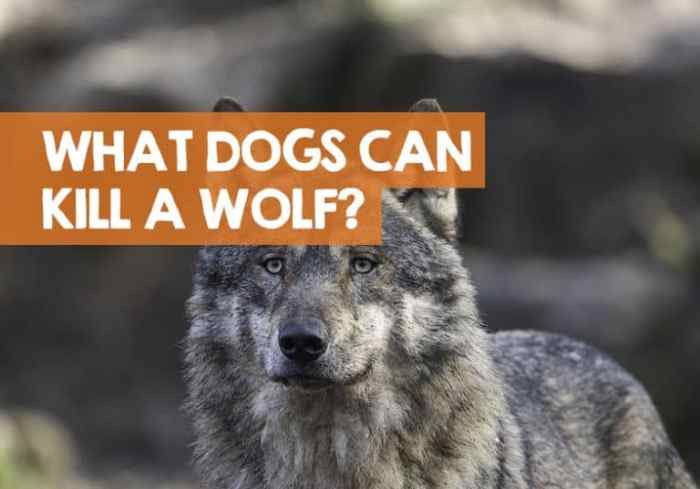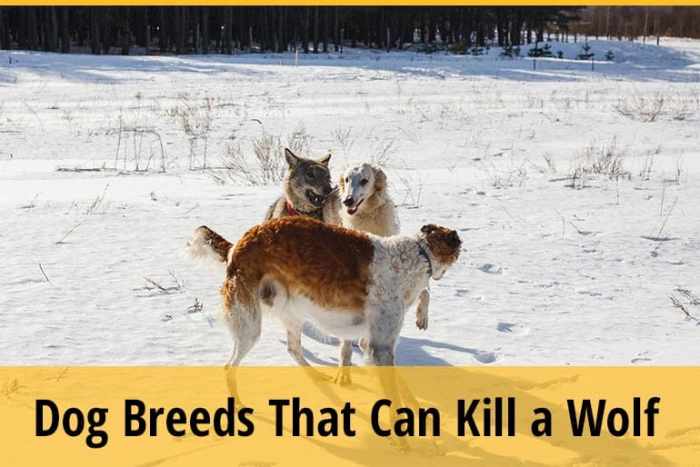Dogs that can kill wolves have a long and fascinating history, with certain breeds being specifically bred for the task. From ancient wolf hunts to modern-day encounters, these dogs have proven their mettle time and again.
In this article, we’ll explore the breeds known for their wolf-hunting prowess, recount historical accounts of dogs successfully killing wolves, and discuss recent encounters where dogs have faced off against these formidable predators. We’ll also provide guidance on training dogs to deter wolves and emphasize the importance of responsible dog ownership in wolf territory.
Dog Breeds Known for Wolf Hunting: Dogs That Can Kill Wolves

Dogs have been used for wolf hunting for centuries. Certain breeds have been specifically developed for this task, possessing the physical and temperamental traits that make them formidable opponents for wolves.
These breeds typically have large, powerful bodies, strong jaws, and keen senses. They are also intelligent, trainable, and have a high prey drive.
- Irish Wolfhound:A giant breed with a long, shaggy coat and a distinctive, wolf-like appearance. Irish Wolfhounds were originally bred to hunt wolves in Ireland.
- Scottish Deerhound:Another large, sighthound breed with a long, flowing coat. Scottish Deerhounds were used to hunt wolves in the Scottish Highlands.
- Borzoi:A Russian breed with a long, silky coat and a graceful, athletic build. Borzois were used to hunt wolves on the steppes of Russia.
- Akita:A large, Spitz-type breed with a thick, double coat. Akitas were used to hunt wolves in Japan.
- Alaskan Malamute:A powerful, sled-dog breed with a thick, double coat. Alaskan Malamutes were used to hunt wolves in the Arctic regions.
Historical Accounts of Dogs Killing Wolves
There are numerous historical accounts of dogs successfully killing wolves. One of the most famous examples is the story of Gelert, a faithful hound who killed a wolf that had attacked his master’s child.
In another instance, a pack of hounds led by a Scottish Deerhound named Bran killed a wolf that had been terrorizing a village. The hounds surrounded the wolf and attacked it from all sides, eventually killing it.
Modern-Day Encounters

While wolf hunting with dogs is no longer common, there are still occasional encounters between dogs and wolves in modern times.
In 2015, a pack of dogs in Alaska killed a wolf that had been attacking their owner’s livestock. The dogs surrounded the wolf and held it at bay until the owner arrived and shot it.
Training and Techniques for Wolf Deterrence

Dogs can be trained to deter wolves using a variety of methods, including socialization, body language, and scent marking.
Socialization:Dogs that are socialized with other dogs and animals are less likely to be aggressive towards wolves.
Body language:Dogs can communicate with wolves through body language. By standing tall, making direct eye contact, and barking, dogs can make themselves appear larger and more threatening.
Scent marking:Dogs can also deter wolves by marking their territory with urine or feces. This sends a message to wolves that the area is already occupied.
Safety Considerations

It is important to be aware of the potential dangers when hiking or camping with dogs in wolf territory.
Keep your dog on a leash:This will prevent your dog from running into a wolf.
Be aware of your surroundings:Pay attention to any signs of wolves, such as tracks or droppings.
Make noise:Talking, singing, or clapping your hands will help to deter wolves.
FAQ Section
What are the most common breeds of dogs used for wolf hunting?
Historically, breeds such as the Irish Wolfhound, Scottish Deerhound, and Borzoi were used for wolf hunting.
Have there been any recent cases of dogs killing wolves?
Yes, there have been several recent cases of dogs, such as the Kangal and the Akbash Dog, successfully killing wolves in defense of their territory or livestock.
How can I train my dog to deter wolves?
Training methods include scent marking, body language cues, and using a shock collar as a last resort. It’s important to consult with a professional trainer for guidance.
